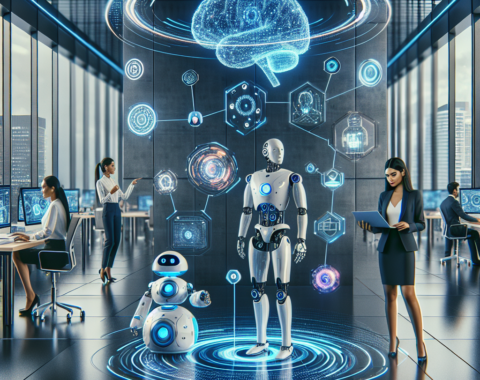
California Enacts Laws Safeguarding Actors from AI Exploitation
In a significant legislative move, California has stepped up to protect the unique rights and voices of Hollywood actors against the rapidly evolving landscape of **artificial intelligence (AI)**. The newly-enacted series of laws aim to shield actors from their likenesses and performances being misused or replicated without proper consent. As AI technology increasingly integrates into film and entertainment, these measures hold unforeseen importance for the industry as a whole.
The Growing Influence of AI in Entertainment
The embrace of AI within the entertainment sphere has seen incredible advancements. Whether it’s through **special effects**, character generation, or voice modulation, AI systems are now integral to the creative process. However, this technological progression brings with it the looming threat of exploitation, particularly when it concerns the finest asset of the entertainment industry: its actors.
The Threats at Hand
As AI technology develops, several potential threats have emerged that could affect actors negatively:
- **Deepfake technology**: The potential to convincingly morph faces and voices onto other bodies, posing risks of unauthorized use.
- **Digital recreations**: Full-body digital replicas of actors can be used without needing their physical presence.
- **Voice synthesis**: Replicating an actor’s voice to create unauthorized content.
These technological advancements, if unchecked, threaten to compromise the very identities and livelihood of actors.
Specifics of the New Legislation
In response to these challenges, California’s newly enacted laws are designed to provide comprehensive protection to actors against such AI-driven misuse. Here’s a breakdown of the key elements:
Licensing and Consent
At the core of the legislation is the need for explicit consent and licensing agreements before employing any AI-driven tools that replicate or use an actor’s likeness or voice. This ensures that actors maintain **control** over how their identities are used, preserving their rights to authorize or reject such applications.
Penalties and Enforcement
The new laws come equipped with significant **penalties for non-compliance**. Companies found exploiting AI recreations without appropriate permissions can face hefty fines and legal ramifications, establishing a deterrent effect. Moreover, these statutes empower actors to pursue legal action against unauthorized usages.
Industry Reactions
Since the announcement of this legislation, there has been a mixed response within the entertainment industry:
- **Support from Actor Unions**: Organizations like the Screen Actors Guild-American Federation of Television and Radio Artists (SAG-AFTRA) have shown strong support, viewing the laws as a much-needed shield for their members.
- **Concerns from Tech Firms**: Some technology-focused entities are expressing concern that these new restrictions may hamper creativity and innovation.
Despite differing views, there’s a common understanding that a balance must be struck between technological advancements and protecting personal rights.
The Ethical Implications of AI in Entertainment
Beyond legal and practical concerns, there’s an ethical discussion emerging from the intersection of AI and entertainment. This legislation pushes us to reflect on the following considerations:
Identity and Ownership
Who truly owns the likeness and voice of an individual? This question now spans digital domains, demanding stricter definitions and **boundaries** for digital ownership.
The Future of Performance
Could the widespread use of AI diminish the value of live performance and physical presence? The path ahead only underscores the need to appreciate and honor human contribution in cinematic arts.
Looking Ahead: The Future of AI and Acting
While California has led the charge, the challenge now is for other states and countries to adopt similar protective measures. Moreover, industry stakeholders should work towards sustainable practices that leverage AI in ethical and beneficial ways.
The Role of Technology
Collaboration with AI companies can lead to innovative guidelines that not only protect but also enhance actor involvement. These partnerships could pave the way for **new creative ventures** while ensuring that artists remain central to the narrative.
Global Standards
Developing international standards for AI use in entertainment could prevent exploitation on a wider scale. Global cooperation is essential to craft rules that are respected across borders, ensuring a fair playing field for actors worldwide.
Conclusion
California’s legislative step represents a pivotal moment in the interaction between modern technology and age-old professions. By safeguarding the identity, voice, and likeness of actors, the state is affirming the value of human creativity in an AI-driven world. As technology continues to grow and intertwine with our lives, protective efforts like these are crucial for maintaining integrity, respect, and justice within the realm of entertainment. The change is both necessary and timely, signaling a new dawn where AI serves as an ally, not an adversary, to human artistry.




